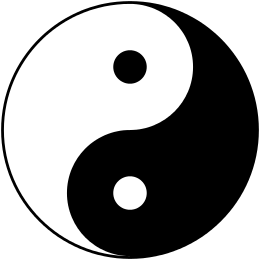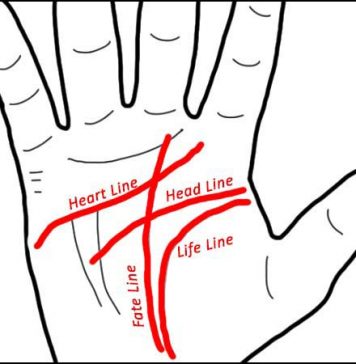Karma is more complex than the general idea of “if we do something good then good things will happen to us” and “when we do something bad then bad things will happen to us.” In Sanskrit, Karma means “for action” and used with connotation of consequence. Intention is the key to understanding how it works. Simply stated, Karma is action, work, or deed. It is any kind of intentional action, whether mental, verbal, or physical. It is the spiritual principle belief of cause and effect where intent and actions of a person cause or influence the future of an individual. Good deeds and intent mean good karma, which means future happiness. Bad intentions or deeds result in bad karma and future suffering. While not a core component of the Astrological system, Karma fits into the whole belief system of being who you were destined to be and making the right decisions based on your surroundings.
All good or bad action constitutes karma. All moral and immoral volition is karma. Any involuntary, unintentional, or unconscious action is not karma because it is missing volition. The roots of Karma are ignorance and craving. We are the result of what we were and will be the result of what we are. There is no doubt that the present is the offspring of the past and the present of the future. In Tibetan, it is the action to the seed that produces the result. Results follow naturally from action.
Karma Overview
There are multiple definitions based on beliefs. The meaning, scope, and importance all vary based on religious. Hinduism, Buddhism, and Jainism are some of the main religions that believe in karma. In Indian religions, the belief is that it affects the next lives or future lives. Its an executed act of activity. The present circumstances are explained by actions in the past. Karma is the action and vipaka is the result or reaction. Every activity is accompanied by due effect. Experience depends on the nature of the seed. Human justice has no effect in that natural law will respond no matter what. Natural law states that acts bear own rewards and punishments to individual doer. Through the variances there are three common themes of karma within religions. These are: causality, ethicization, rebirth.
This first theory of causality means the executed actions of the individual affects the individual and their life. It is the cause and effect in the ethical realm. Intentions will affect them and how they live. In this theory, disinterested actions, or unintentional actions, do not have the same positive/negative effect. It is all based on material, moral, or emotional actions. Like deeds create like effects, though not always immediate. With causality, the consequences and effects can be felt in two different ways. There is phalas, or the fruit/result of the actions. This is visible or invisible, but felt immediately in the current life. Samskaras are the invisible effects that are internal and affect the person to where they are happy or unhappy in this life and the future.
Karma seeds habits, habits create nature of man. Karma seeds self perception, perception influences how a person experiences life events. Habits and self perception affect the course of ones life. It is not easy to break bad habits, this requires conscious karmic effort. The psyche and habits link karma to causality. The character of a person is the assessment that is determined by habitual thinking and acting.
The second theory is ethicization. Every action has a consequence that comes to fruition at some point. There is no reward or punishment but a law of consequence. It is ethical because your intentions, attitudes, and desires count if the outcome was intended. This means there is less moral responsibility. Karma considers actions and intent, not just causal. This encourages seeking and living moral lives. It is the building block of theory.
The third theory is that of rebirth. Samsara is going through the cycle of reincarnation. There are series of births and rebirths. They can be in different realms, conditions, or forms. It is dependent on the quality and quantity of the karma. Every living being’s soul transmigrates after death with seeds of life just completed. This continues indefinitely, except when consciously reach the moksa (the realm of Gods).
Karma means action, whenever there is an action there is a reaction. We are not only physical beings, but also emotional and spiritual as well. This means any thought, word, or action will have an effect. It doesn’t take place without causing a ripple of some description in universe.
Propelling karma is one that propels one into state of existence, whatever that may be. Completing karma determines the specific circumstances within that state of existence. It fills in the basic outline that is produced by propelling karma. Karma itself is the result of volitional (chosen) action. It is not always completely conscious. It is a result of such things as affect, subconscious, disposition, and conscious decision.
There are two sides, intention and reception. You might intend something in one way only to have someone receive it in entirely another way. Karma generates one or another kind of reaction. Most karmas ripen in lifetime we are in but not always completely. When there is more to the story, then its just the seed of karma.
Buddhism

Inequality can be hereditary, partially due to nature versus nurture. It can also be due to past actions and present doings. We are responsible for our own happiness and misery. We are born with our hereditary characteristics and then possess certain innate abilities without scientific explanation.
Our accumulated karmic tendencies from other lives can be more powerful than anything hereditary. As Buddha states “we are heirs of our own actions.” It is not a fatalistic doctrine and it is not saying that everything is pre-determined.
There are 5 orders or processes that operate in our physical and mental realms:
- Utu: order of the inorganic seasons (physical, wind and rain)
- Bija: order of germs and seeds (scientific theory)
- Kamma: order of act and result (innate sequence)
- Dhamma: order of norm (natural phenomena occurring at advent of Bodhisattva)
- Citta: order of mind or psychic law (process of consciousness)
Buddha identified six intentions that are often our motivators for what we do:
-
- good-will or kindness
- compassion
- generosity
- anger
- cruelty
- greed
Intentional acts keep us tied to rebirth. Kamphala is the outcome of the natural process of cause and effect. A deed done deliberately through body, speech, or mind leads to future consequences. This is a fluid and flexible process. It is not a linear relationship from action to consequence. It is not just based on deed, but considers a person’s nature and the circumstances. Volition is the will, tatana is the doer. Vedana is the reaper of actions.
There are seven tattvas or truths that constitute reality. They are:
- Jiva: The soul which is characterized by consciousness.
- Ajiva: The non soul.
- Asrava: In flow of auspicious and evil karmic matter into the soul.
- Bandha: Mutual intermingling of souls and karmas.
- Samvara: Obstruction of in flow of karmic matter into the soul.
- Nirjara: separation or falling off of part of karmic matter from the soul.
- Moksha: the complete annihilation of all karmic matter (bound with any particular soul).
Karma is a self sustaining mechanism that is the natural universal law. The soul attracts karmic matter even with thoughts, not just actions. You need three jewels: samyak darsana (Right Faith), samyak jnana (Right Knowledge), and Samyak chartra (Right Conduct).
People are born to a state created by the self. By our own self directed effort there is the possibility for us to create new, favorable environments in here and now. We are at liberty to create fresh karma that leads to progress or downfall in life. One’s own doing is reacting to oneself. In the here and now we have the possibility to divert the course of our karma to certain extent.
Ignorance, or avijja, is not knowing things as they truly are. This is the chief cause of karma. Craving is tanha, or the other root of karma. Evil actions are conditioned by these two causes. All good deeds are associated with the three wholesome roots of generosity, goodwill , and knowledge. These are regarded as Karma because two roots of ignorance and craving are dormant.
There are four kinds of Karma:
REPRODUCTIVE: Every birth is conditioned by past good or bad karma. Pain and consequences are experienced and are inevitable.
SUPPORTIVE: Comes near reproductive and supports it. It is not good or bad. They assist or maintain action of the reproductive karma in the course of a lifetime.
OBSTRUCTIVE: It is counteractive karma which weakens and interrupts reproductive karma.
DESTRUCTIVE: The power of reproduction karma is nullified by powerful opposing Karma past.
Karma is classified by the priority of the effect:
WEIGHTY: Produces results in this life or next. It overrides other happenings. Crimes that would fall into this category include: matricide, patricide, wounding Buddha, schisms in Sangha, and Arahant murder.
PROXIMATE: This is what occurs just before dying and plays a great part in future birth. Reminds of good deeds and to do good at the death bed.
HABITUAL. Habits become second nature from character of the person.
RESERVE/CUMULATIVE. This is the reserve fund. Whatever is not already mentioned is not forgotten, but placed here.
There is also classification based on the time that the effects are worked out:
IMMEDIATELY: This is experienced in the present life.
SUBSEQUENTLY: This effect is seen in the next birth. It is a ‘seventh thought’ moment.
INDEFINITELY: The effect of intermediate thought. These are moments that can take affect at any time.
DEFUNCT/INEFFECTIVE: They do not operate in this life.
Additionally, there are five conditions that modify the weight of karma. Three are subjective: the persistent or repetitiveness of the action, the willful intent on doing the action, and the absence of regret. There are two objective: the quality and the degree of in-destructiveness incurred toward one at which action is desired.
The last classification is the plan it affects. Evil ripens in the sentient planes. Good actions ripen in the sentient as well except for the four woeful. Good actions ripen in the realm of form as well. Maleficent and beneficent forces and conditions counteract and support self operating law. There are no masters or servants. This is evident from these counteractive and support factors that fruition of Karma is influenced, to a certain extent. These include surroundings, personality, individual striving, etc.
This is the doctrine that gives consolation, hope, reliance, and moral courage to a Buddhist. The unexpected difficulties, failures, or misfortunes are all things a Buddhist realizes he is repaying. By experiencing these, he is wiping clean past debt. By making a strenuous effort to pull weeds and sow useful seeds in place, the future is in his hands.
The core concern of law of Karma is restoration of balance. We suffer pain we once caused someone else. Given the critical opportunity to increase sensitivity to sufferings of others and learn to respect the sanctity of lives other than our own. Karma is always in motion and our only control is how long takes to learn.
To strengthen the negative side of being, we lengthen our evolutionary journey. With Karma, more lifetimes needed to grow means there is more weight to carry which means we may be more unhappy and lost. Adding to karma slows life’s momentum. The opposite is also true. If things are clear, then you will accelerate, gain spiritual traction, and develop positive life momentum. Your inner light will shine brighter. If you are missing all this if you create negative karma which halts momentum and anxiety abounds.
By committing an act, whether good or evil, you produce an heir to the action. This influences the course of one’s existence from that point on. Everything we say, think, and do serves as a cause that will at some time in the future manifest an effect. We are responsible for every effect including emotions. We do not perceive at a conscious level how it all works, only those enlightened can.
The law of cause and effect is impartial, impersonal, and strict. This places the power to change destiny firmly in our hands. We can determine our degree of happiness or suffering in our lives by continuously attempting to reform. Karma is not fate, it is action. It is not judgement, it is natural. Things arise from actions. It cannot be reversed. The only way to alter effects of bad karma is by creating better situations in the present.
Each soul itself keeps a tally of total karma due to thoughts, intentions, words and actions. On death, the soul re-evaluates the karma and decides what experiences it needs to further spiritual evolution. The soul doesn’t have same view of unpleasant earthly experiences that our conscious mind might have. You might be amazed to think your soul decided to give you each of the experiences you have had in your life. There are lessons to be learned by all if you look at it from a bigger picture.
Before the next incarnation, the soul waits until the planets are at exactly the correct position over a particular point on earth, to match the karma that must be experienced in this life in order to give it the chance for further development. In the beginning, it is delivered into earthly cycle. Forget the spiritual beings and become deeply involved in the physical and material world in pursuit of pleasure and desires. This is maya (or a state). It is an illusion that physical and material world or sensory gratification will make us happy and content. Eventually through experience and a need to find the truth we start to progress back to our spiritual world and eventually reach liberation or Moksha. At an unconscious level or a soul level, you have to set up yourself by your previous or present thoughts, actions, and attitudes. This may have been set in motion long ago and needs to come into fruition in this life for you to experience. At some level, if you can come to a level of acceptance and take full responsibility for your karma then you start to break cycle. At face value, it may indeed feel totally unfair that bad situations happen to you. Especially if you are conscious of trying to be a good person. Accept at some level this is what you have created, even though you may not be able to remember or understand when, how, or why this took place. Then you will not be making any more difficult karma for future. Do not beat yourself up for it. Likely, in the past you were doing the best you could with what you had, at the time, in terms of knowledge and wisdom. You need to change the perception of it now. Look for the teaching or the lesson that occurrences are telling you about yourself. Seek help in coming to an acceptance or understanding through the counseling process and through spiritual practice. It is full of experiences. You may have a good job and valuable assets, but without good relationships it is likely that meaning, purpose, happiness, or peace will be missing for you. There is no doubt that you can resolve any suffering in present moment through the Buddhist teachings of mindfulness.
Karma has implications beyond this life. Bad actions in a previous life can follow a person into the next life and cause bad effects. Try to cultivate good karma and avoid bad. The aim of Buddhism is to escape the cycle of rebirth altogether, not simply to acquire good karma and so to be born into more pleasant state.
Karma is determined by our own actions, in particular by motives behind intentional actions. Skillful actions that lead to good karmic outcomes are based upon motives of generosity, compassion, kindness, and sympathy and clear mindfulness or wisdom. Opposite motives of greed, aversion and delusion, when acted upon, lead to bad karmic outcomes. This is not an external force, not a system of punishment or reward dealt out by god. This concept more accurately is a natural law similar to gravity. A person’s nature is shaped by their moral actions. Every action we take molds our characters for the future. Both positive and negative traits can become magnified over time as we fall into habits. Buddhists gradually weaken any negative thoughts and impulses that they experience, through allowing them to arise and depart naturally without acting on them. That is how you break karmic habits.
We are in control of our ultimate fates. The problem is that most people are ignorant of this, which results in suffering. Buddhism creates the purpose of taking control of our behavior. The two basic concepts of Buddhism is that karma and karmaphala explain how actions and deeds keep us tied to rebirth in Samsara.
Buddha’s teachings include:
“Do not think a small sin will not return in your future lives
Just as falling drops of water fill a large container
The little sins that steadfast accumulate will completely overwhelm you
Do not think a small virtue will not return in your future lives
Just as falling drops of water will fill a large container
The little virtues that steadfast accumulate will completely overwhelm you”
This explains a nature of reality, everything is interrelated and only exists as a small part of karma and its effect on our lives. This is a cycle of cause and effect. Each action a person takes will affect him or her at some time in future. The rule also applies to a person’s thoughts and words as well the actions other people take under that individuals instructions. Karma is often misused.
Karma is concerned with the relationship between actions and consequences as well as also the moral reasons or intentions behind actions. Examples are someone who commits a good deed for the wrong reasons or they make a charitable donation to impress a potential love interest. If the action is immoral it produces bad karma.
Western Buddhism is more psychological. Intentional acts of body, speech, and mind have psychological consequences for everyone, not just for oneself. Universal karma is the system of karmic justice. It is a religious belief.
Hinduism
With Hinduism, intent and action both have consequences. Karma lingers but never disappears. All positive and negative experiences in life require effort and intent. There are many schools of thought but in Hinduism it is believed it is a force generated by a person’s actions. There are ethical consequences and nothing happens for no reason. We are responsible for our own happiness.
They believe the soul passes through the cycle of successive lives (samsara) and the next incarnation is dependent on how the previous life was lived. In a lifetime, we build up good and bad karma which affects future life and existence.
Moksha is the end of the death and rebirth cycle and is classed as the fourth and ultimate artha. This is achieved by overcoming ignorance and desires. Paradox is a sense that overcoming desires also includes overcoming the desire for moksha itself. This is achieved in life and after death.
Originally, Karma started in ancient India. Hindu believe the rules of all consciousness. We have the free will to create our own destinies and “returns.” Hinduism believes that Karma is produced in 4 ways:
1. Thoughts
2. Words
3. Actions performed
4. Actions that are performed under instructions
Jainism
In this religion, Karma has a totally different meaning. It is the oldest Indian philosophy that separates body from soul (pure consciousness). Karmic dirt is the subtle particles of matter that pervade the universe. They are attracted to the karmic field of soul due to vibrations created by activities of mind, speech, and body as well as mental dispositions. It is subtle matter surrounding the soul. When consciousness and karma interact, you experience life at present.
In India, Karma is taught by 24 propagators of faith. They believe karma is a reference to the soul. They can control it by effort, knowledge, and discipline. Cruel, selfish actions will lead to heavy karma making the soul drown whereas suffering taken willingly will help to lighten the soul.
12 Karmic Principles
1. The Great Sacred: As you sow, so shall you reap. This is the law of cause and effect. What you put out, you will get back. If you want happiness, then be a happy, peaceful, loving friend.
2. Sacred Principles of Creation: Life does not just happen, it requires our participation. We are one with the universe, both inside and out. It surrounds us, as clues to our inner state. Be and do what you want to have in life.
3. Sacred Principles of Humility: What you refuse to accept will continue for you. If we see an enemy or a trait we deem negative, then we are not focused on a higher level of existence.
4. Sacred Principles of Growth: Wherever you go, there you are. To grow in spirit, it is we who must change and not the people, places, or things around. All we are given in life is our self and that is the only factor we have control over. If we change who or what we are within our heart, we change our life.
5. Sacred Principles of Mirrors/Responsibility: Whenever something is wrong, something is wrong with me. A mirror is what surrounds us, what surrounds us mirrors us. Take responsibility for what is in your life.
6. Sacred Principles of Synchronicity/Connection: Even if something seems inconsequential its important it gets done as everything in the universe is connected. Each step leads to the next and so on/so forth. Someone must do the initial work to get the job done. Not one step is more important than the other, they are all needed. All of it is connected.
7. Sacred Principles of Direction/Motives/Focus: Don’t think of it as two things at the same time. You go up the ladder one step at a time. When you lose focus, you let in insecurities and anger.
8. Sacred Principles of Willingness/Giving and Hospitality: If you believe something to be true, then some time in life you will be called upon to demonstrate that truth. This where we put what we say we have learned into practice.
9. Sacred Principles of Here and Now: Looking back to examine what prevents us from being totally in the here and now. Old thoughts, old patterns of behavior, old dreams; they all prevent us from having new.
10. Sacred Principles of Change: History repeats itself until we learn the lessons needed to change the path.
11. Sacred Principles of Patience and Reward: All rewards require initial toil. Rewards of lasting value require patient and persistent toil. True joy follows doing what we are supposed to be doing and waiting for reward to come in own time.
12. Sacred Principles of Value and Upliftment: You get back from something whatever you’ve put into it. The value of something is direct result of energy and intent that is put into it. Every personal contribution is a contribution to the whole. Lackluster contributions have no impact on the whole or will diminish any gains.
Ultimately, your own doings create your heaven and hell. The incentive is to do good, become kind, tolerant, and considerate.











